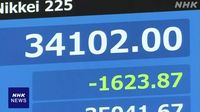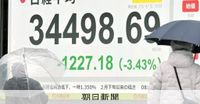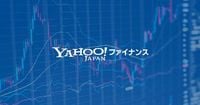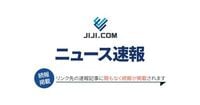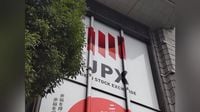On April 3, 2025, the Tokyo stock market faced a significant downturn as the Nikkei Stock Average plummeted sharply, falling over 1,600 yen shortly after trading commenced. This decline was primarily triggered by U.S. President Donald Trump’s announcement regarding new ‘mutual tariffs,’ which included a substantial 24% tariff on Japanese imports. The Nikkei average closed the morning session at 34,673.69 yen, down 1,052.18 yen (2.95%) from the previous day’s close, marking a critical breach of the 35,000 yen threshold for the first time in approximately eight months.
The announcement of these tariffs on the morning of April 3, Japan time, created ripples of concern regarding the potential negative impacts on the Japanese economy and corporate performance. The initial trading session saw the Nikkei average drop to as low as 34,100 yen, reflecting a sentiment of risk aversion among investors. This marked the largest trading decline of the year so far, as fears escalated that the tariffs would exacerbate existing economic challenges.
Investors reacted swiftly to Trump’s declaration, which included a uniform 10% tariff on all countries and regions not exempted by individual agreements. The automotive sector, a significant pillar of Japan’s economy, was particularly hard hit, with stocks such as Toyota experiencing sharp declines. Fast Retailing, another major player in the Nikkei, also updated its low for the year, contributing to the overall market slump.
Market analysts noted that the unexpectedly high tariff rate raised concerns about deteriorating corporate earnings. Kazuo Kamitani, a senior analyst at Nomura Securities, highlighted that “the stronger-than-expected tariffs have intensified concerns about a slowdown in the global economy, and Japanese companies, particularly in the automotive sector, will inevitably face negative impacts.”
In addition to the stock market turmoil, the yen strengthened against the dollar, trading at approximately 147 yen per dollar, a notable increase of about 1.70 yen from the previous day. This surge in the yen was attributed to a flight to safety among investors, who sought more stable assets amid growing fears of a global economic downturn.
As the morning session progressed, the Nikkei average saw a brief recovery as some investors engaged in bargain hunting, attempting to capitalize on the lower prices of stocks. However, the prevailing sentiment remained cautious, with many market participants expressing uncertainty about the extent of the tariffs' impact. “The full extent of how these tariffs will affect corporate earnings is still unclear,” stated Hiroshi Matsumoto, a senior fellow at Pictet Japan. “While the immediate reaction has been negative, we may see buying activity as investors look for opportunities at lower price points.”
The TOPIX (Tokyo Stock Price Index) also experienced a decline, closing the morning session down 87.58 points (3.30%) at 2,562.71. Trading volume on the Tokyo Stock Exchange was approximately 128.578 million shares, with 1,503 stocks declining compared to only 114 that rose.
In response to the market’s reaction, Prime Minister Fumio Kishida instructed relevant ministers to thoroughly assess the implications of the tariff measures and to ensure adequate financial support for affected companies. The Prime Minister emphasized the need for vigilance as Japan navigates these new economic challenges. “We must prepare for the impacts of these tariffs and support our industries through this period,” he stated.
Moreover, the geopolitical implications of the tariffs were also significant, with China announcing it would implement countermeasures in response to the U.S. tariffs. This move further heightened tensions in international trade relations, prompting fears of a broader economic conflict.
As the day unfolded, it became clear that the market’s volatility was a reflection of deeper anxieties regarding the global economic landscape. Investors were left grappling with the uncertainty of how these tariffs would reshape trade dynamics and corporate profitability in the months to come.
In summary, the events of April 3, 2025, underscored the fragility of the current economic climate, with the Nikkei Stock Average's sharp decline serving as a stark reminder of the interconnectedness of global markets. As Japan braces for the fallout from these new tariffs, the focus will be on how the government and businesses adapt to these challenges moving forward.

